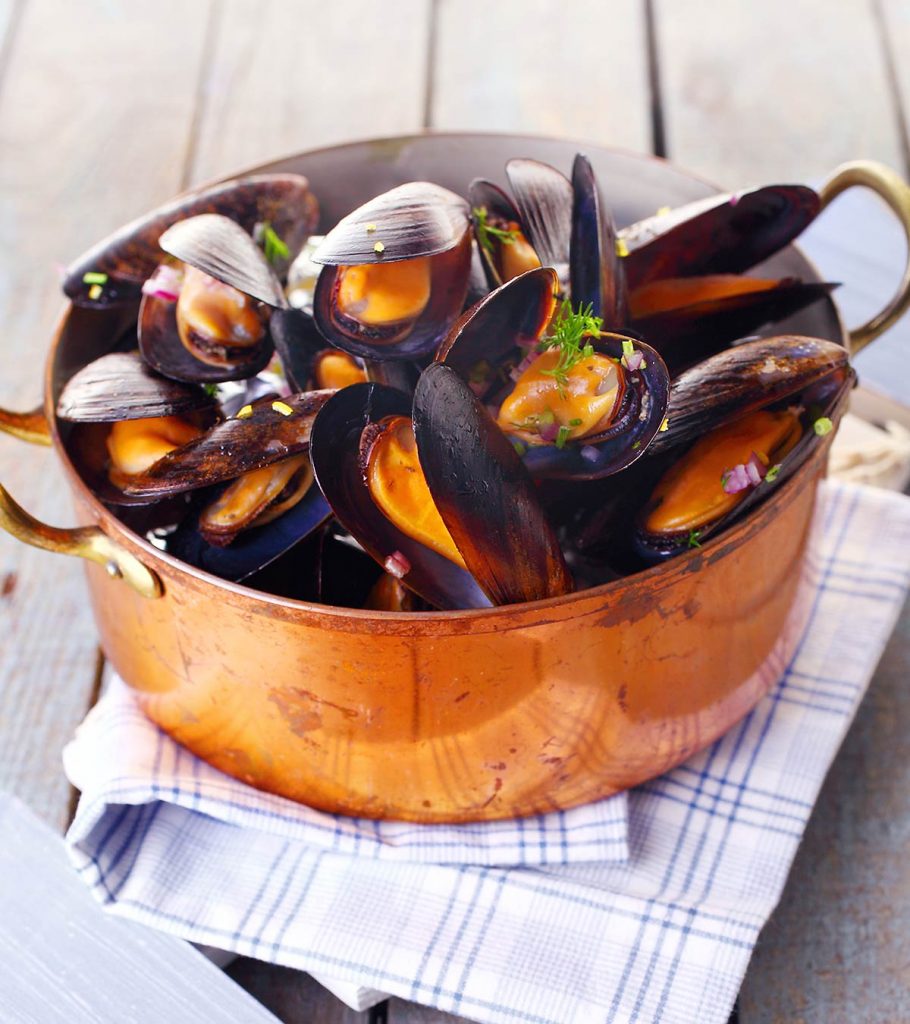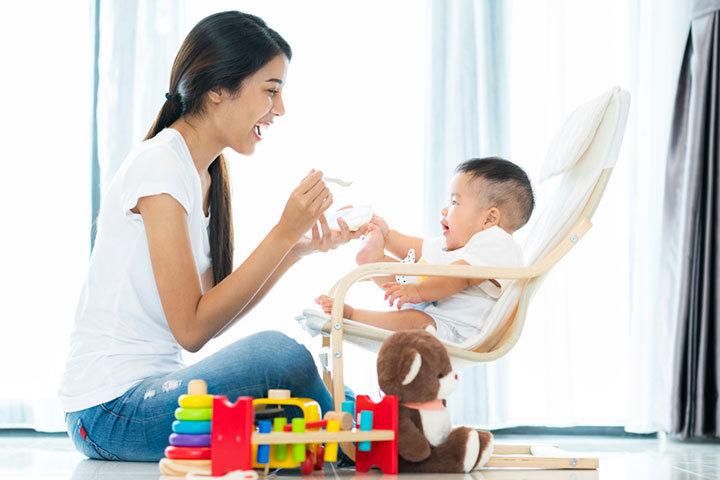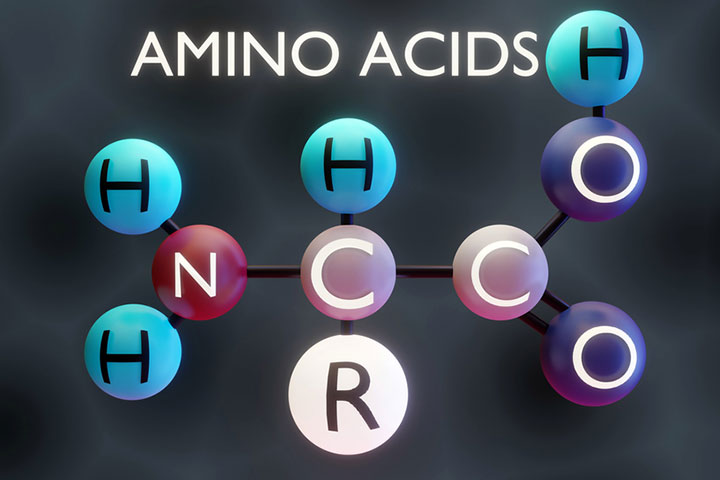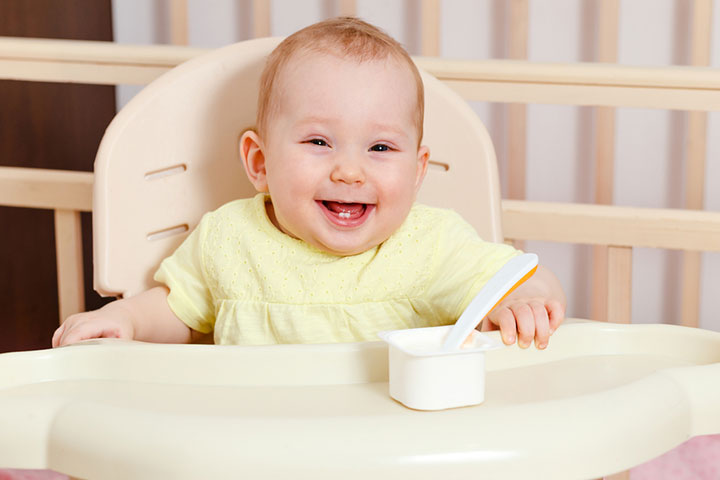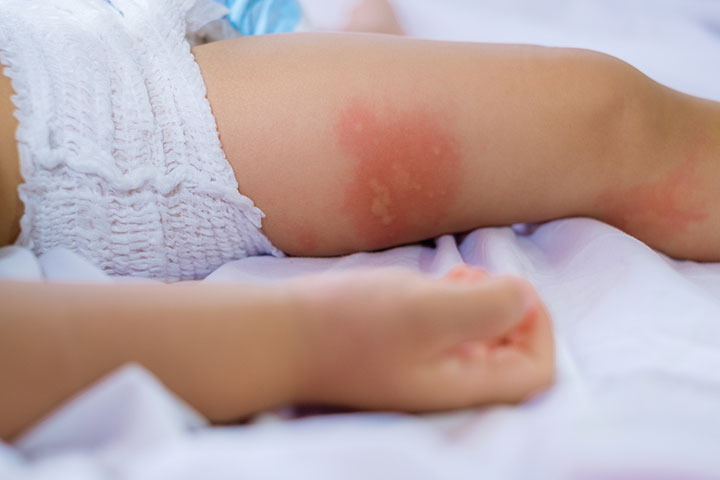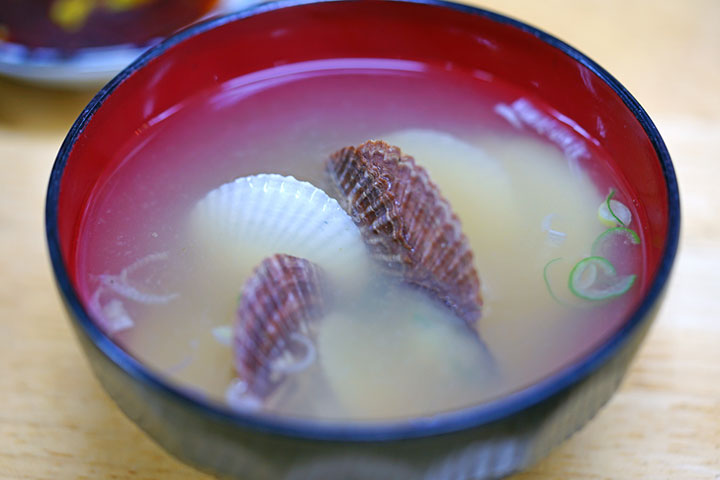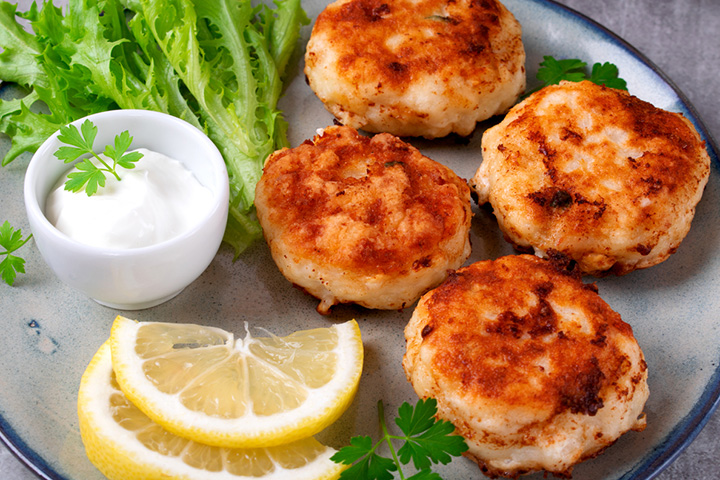A shellfish is an aquatic creature with an exterior that resembles a shell and lives in freshwater and saltwater. When can babies eat shellfish–is a question many parents have. Although adding shellfish to a baby’s diet might be beneficial for their health, it can also trigger allergies since they can be contaminated with hazardous materials such as cadmium and mercury.
These creatures are divided into mollusks and crustaceans and are rich in micronutrients, protein, and healthy fats, which can help support a baby’s development and growth.
In this post, we tell you about the nutritional value of shellfish, when to introduce it to your baby, how to safely consume it, and points to consider when feeding it to your baby.
When Can Babies Eat Shellfish?
Some experts suggest feeding well-cooked shellfish once the baby is older than six months and has started consuming other solids, such as cereals, grains, poultry, and meat. However, some recommend delaying it up to 9 to 12 months due to its potential to cause allergies (1).
A mother and food author shares her experience of how she introduced mussels to her two children, and her daughter couldn’t stop eating them. She recounts, “Our daughter is three years and two months now, our son one year and three months. They both adore mussels. We discovered our daughter’s love for shellfish back in 2010 when testing recipes for my first cookbook. She was one year and eight months old at the time; way too early for enjoying mussels, I thought for some reason. We gave her one just for fun, and she was immediately taken. She had 35 mussels in one go that night. I know, we counted them, amazed. She would have had more if we had let her, but as we could visibly see her tiny belly filling up, we simply said stop at one point (i).”
Consult a pediatrician and know the right age to start feeding shellfish to your baby, especially if you have a family history of food allergies.
Consult a pediatrician and know the right age to start feeding shellfish to your baby, especially if you have a family history of food allergies.
Nutritional Value Of Shellfish
The nutritional value varies across the types of shellfish (crustaceans and mollusks). The commonly consumed crustaceans are crab, crayfish, lobster, shrimp, krill, and prawn, while widely consumed mollusks are clams, scallops, oysters, and mussels (2).
Below is an approximate nutritional composition of various shellfish types (cooked) with a serving size of three ounces (85g) (3).
| Type | CALORIES (KCAL) | Protein (g) | Fat (g) |
|---|---|---|---|
| Scallops | 140 | 27 | 1 |
| Shrimp | 100 | 21 | 1.5 |
| Blue crab | 100 | 20 | 1 |
| Lobster | 80 | 17 | 0.5 |
| Clams | 110 | 17 | 1.5 |
| Oysters | 100 | 10 | 4 |
Source: FDA
Possible Health Benefits Of Shellfish For Babies And Toddlers
Different shellfish have different health benefits. Some of the common ones are:
- Rich in high-quality protein: Shellfish like scallops, shrimp, and blue crab contain protein. Seafood protein is also a good source of digestible proteins, essential amino acids that are important for the development of babies (4).
- Abundant micronutrients: Moderate consumption of shellfish can supply vitamins and minerals, such as vitamins B12 and D, sodium, potassium, copper, zinc, and iodine (2). These micronutrients help regulate several essential physiological functions, like physical and mental growth.
- Source of healthy fats: Polyunsaturated fatty acids (good fats), such as DHA and EPA, which are types of omega-3 fatty acids (2), are present in good amounts in shellfish. These nutrients help in the brain heart and brain development.
- Immunostimulating properties: Shellfish contain carotenoids like astaxanthin, which has immunostimulating properties (2). It also has peptides, omega-3 fatty acids, vitamins A, D, B12, iron, copper, and zinc, which are considered beneficial for the immune system (5). Thus, regular consumption of shellfish may help boost immunity in the long run.
Regular consumption of shellfish may have cardioprotective, anti-inflammatory, and antiviral benefits, as well.
Possible Side Effects Of Shellfish In Infants
Just like any other food, shellfish has its share of potential side effects for babies.
- Foodborne illnesses: Raw and undercooked shellfish, mostly clams, oysters, and mussels, may contain viruses and bacteria that can lead to poisoning. Shellfish from contaminated water can contain dangerous pathogens, such as norovirus (6). Besides, contaminated shellfish may contain marine contaminants, such as harmful algal bloom (HAB) toxin and brevetoxin, which might be fatal for babies (7) (8).
- Chemical contamination: Lobsters, scallops, and crab can be prone to mercury contamination (9). Other shellfish can also be contaminated with lead and mercury, especially when harvested from polluted waters. High levels of mercury can adversely affect the central nervous system (10).
- Allergy: The allergic reaction to shellfish depends on the individual and the type of shellfish. Some of the common food allergy symptoms are wheezing, trouble breathing, coughing, diarrhea, stomach ache, red spots, hives, and itchy, watery, swollen eyes. An extreme allergic reaction can cause anaphylaxis (11).
See a doctor promptly if you notice any allergy symptoms or if your baby seems unwell after consuming shellfish.
The best way to avoid these adverse effects is to follow FDA guidelines and advisories on fish and shellfish selection, storage, and cooking.
Tips To Include Shellfish In Your Baby’s Diet
Here are some suggestions that may help in the safe introduction of shellfish to babies, minimizing its potential adverse effects.
- The American Academy of Pediatrics (AAP) recommends serving an ounce (30g) of fish and shellfish, once or twice a week, to toddlers between two and three years of age (12). However, there are no clear recommendations available for babies. When introducing a new food, start with a small amount to minimize a potential allergic reaction. Therefore, consult your pediatrician on the right amount of shellfish consumption for your baby.
- Purchase shellfish from trusted sellers, preferably those approved by the government or the FDA. It can ensure shellfish’s freshness and that it does not contain any contaminants, such as mercury, or has it within the safe limits of human consumption.
- Never feed uncooked or under-cooked shellfish to a baby as it can increase the risk of food poisoning (13). The CDC states that seafood should be cooked to at least 145°F (63°C).
- Cook shellfish at home and do not feed shellfish bought from a restaurant. Do not feed any leftover cooked seafood to a baby. Cross-contamination from cooking utensils or cooks touching different foods occurs easily in restaurants. So ensure to maintain optimum hygiene during food handling and preparation.
- Introduce only one type of shellfish at a time. Follow a “three-to-five day wait” rule to check for allergic reactions.
- Feed small amounts, like half to one teaspoon at a time. It could help your baby to adjust to the taste, texture, and digestion of the food.
- Babies below the age of 12 months should be fed shellfish as puree, paste, or a mash. Toddlers over the age of 12 months can be served well-cooked small pieces of shellfish as finger food.
Baby-friendly Shellfish Recipe For Babies
Babies above six months of age can enjoy this delectable recipe.
1. Grilled Shrimp Cakes
You will need:
- 1.5 pounds shrimps (deveined and peeled)
- 1 garlic clove (finely chopped)
- 1tbsp lemon zest
- 1tbsp lemon juice (freshly squeezed)
- 2tbsp cilantro (finely chopped)
- ¼ cup almond flour
- 1 egg (beaten)
- Salt and pepper, to taste
How to make:
- Heat a pan on medium-high heat.
- Blend shrimp, lemon juice, zest, cilantro, and garlic until you get a smooth, lump-free mixture.
- Combine the above mixture with almond flour, beaten egg, salt, and pepper.
- Make small patties or cakes using the mixture. Put the patties on the grill and cook them on both sides for four to five minutes until they turn golden brown.
- Serve warm with homemade yogurt or guacamole to make a delicious meal for the baby.
When can babies eat shellfish–you may introduce it along with other solid foods by six months, but it may be safer to start them by 12 months as the harmful effects of allergies, if triggered, may be lesser by that age. Start with small portions of well-cooked shellfish and gradually include them as a part of a balanced diet for your baby. Shellfishes are good sources of proteins, micronutrients, and omega-3 fatty acids that may protect against inflammation and viral infections. Exercise caution while selecting, storing, and cooking shellfish to avoid contaminants and the risk of food poisoning.
Key Pointers
- Babies can have shellfish once they start with solid foods, within six to 12 months of age.
- Shellfish are a good source of protein, boost immunity, and contain essential micronutrients.
- You can include shellfish in your baby’s diet about once or twice a week.
- Overconsumption of shellfish by babies might put them at risk of allergies and food borne illnesses.
Explore the numerous benefits of shellfish and how they can improve your health and nutrition. Learn why shellfish can be a great addition to your diet.
